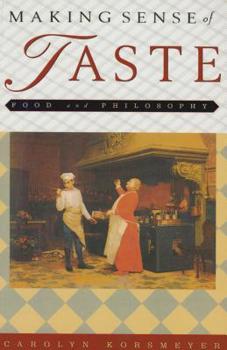Making Sense of Taste
Select Format
Select Condition 
Book Overview
Taste, perhaps the most intimate of the five senses, has traditionally been considered beneath the concern of philosophy, too bound to the body, too personal and idiosyncratic. Yet, in addition to providing physical pleasure, eating and drinking bear symbolic and aesthetic value in human experience, and they continually inspire writers and artists.In Making Sense of Taste, Carolyn Korsmeyer explains how taste came to occupy so low a place...
Format:Hardcover
Language:English
ISBN:0801436982
ISBN13:9780801436987
Release Date:October 1999
Publisher:Cornell University Press
Length:256 Pages
Weight:1.20 lbs.
Dimensions:0.9" x 6.3" x 9.4"
Age Range:18 years and up
Grade Range:Postsecondary and higher
Related Subjects
Aesthetics Agricultural Sciences Anatomy Anatomy & Physiology Biological Sciences Biology & Life Sciences Cooking Cooking Cooking Education & Reference Engineering Food Science Health, Fitness & Dieting Health, Fitness & Dieting History Philosophy Physiological Aspects Politics & Social Sciences Psychology Psychology & Counseling Social Science Social Sciences TechnologyCustomer Reviews
2 ratings
Great Book
Published by Thriftbooks.com User , 16 years ago
Korsmeyer is an excellent and lucid writer, so it should be unsurprising that in this book she so methodically unravels the distinction between the physical sensation of taste and the philosophical problem of taste (e.g. good taste and its subjectivity). Korsmeyer delves into the ancient idea of the supremecy of vision in the hierarchy of the senses and continues examining the long history of these discussions in philosophy, particularly aesthetics. This is a great book for anyone interested in the growing niche of philosophy and food-related matters.
An Important Work in Philosophy of Food and Body
Published by Thriftbooks.com User , 19 years ago
A wide-ranging, insightful and long-overdue look at the bodily senses (touch, taste, smell) from the perspectives of (mostly) Anglo-American philosophy, especially as they apply to food and other objects of taste. Korsmeyer skillfully demonstrates both the historical disparagement of the carnal and the necessity of moving beyond an aesthetic that privleges the "higher, objective" senses of vision and hearing at the rest of the body's expense. She convincingly defends the sense of taste and the enjoyment of delicious foods as important aspects of existence, lays bare the intricate web of bias that has at times excluded the bodily, practical and/or domestic from philosophy, and demonstrates the relevance of this exclusion to key problems and debates that infuse the contemporary intellectual climate. Her understanding of the philosophy of aesthetics is expansive and it shows in the wealth of material she engages in her critique. The arguments for and against taste as an aesthetic sense are lucid and detailed. Korsmeyer also includes many pertinent examples from daily life and experience, as well as physiology and psychology of perception. The quality of argument and example lead one to be truly astouded at how little esteem has been accorded by philosophers to food and its taste, such obviously integral parts of daily life as these are. The price that has been paid for this ignorance is well-demonstrated, along with the interests that have been (and continue to be) privleged by the repression of the sensual. Some of the subject matter is rather specialized in nature, but the lay reader or gastronome will still find much here of interest, and the prose is clear, welcoming and generally quite fascinating. Any lover of food, and anyone who values their body, should understand the bias against the carnal in the intellectual history of the West, if only to be amazed and incensed to revolt. Any philosophers blind to these issues may now easily educate themselves via this topic and book thereon, one of doubtless personal relevance: their daily sustenance. Highly recommended to anyone interested in taste (of food, and in general), aesthetics or the body, at the very least as a excellent survey of the key issues in this growing field of study.






